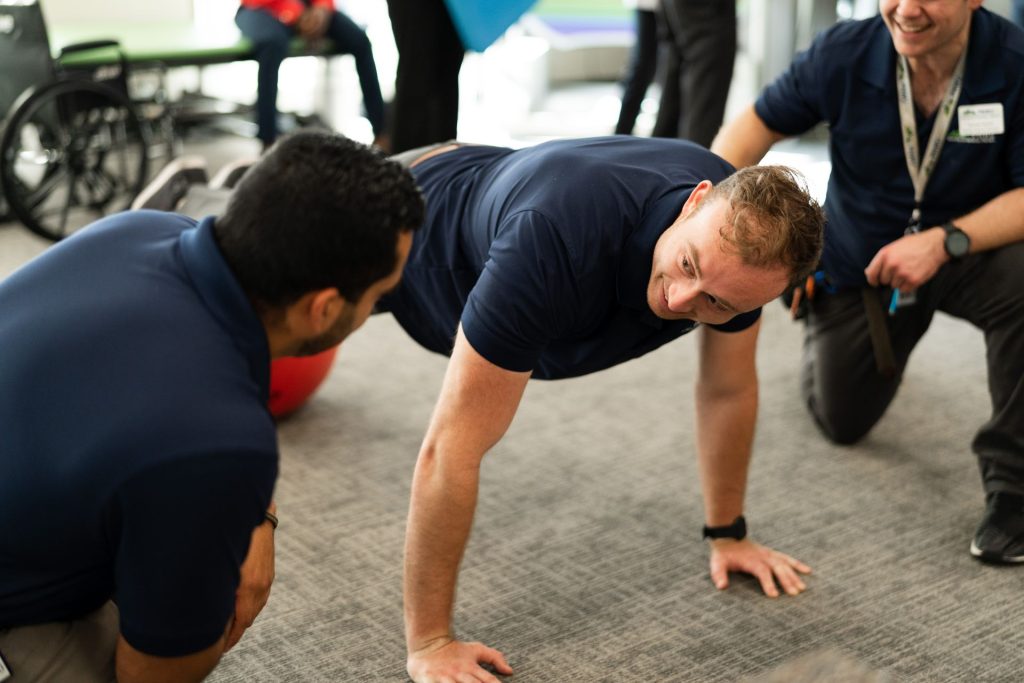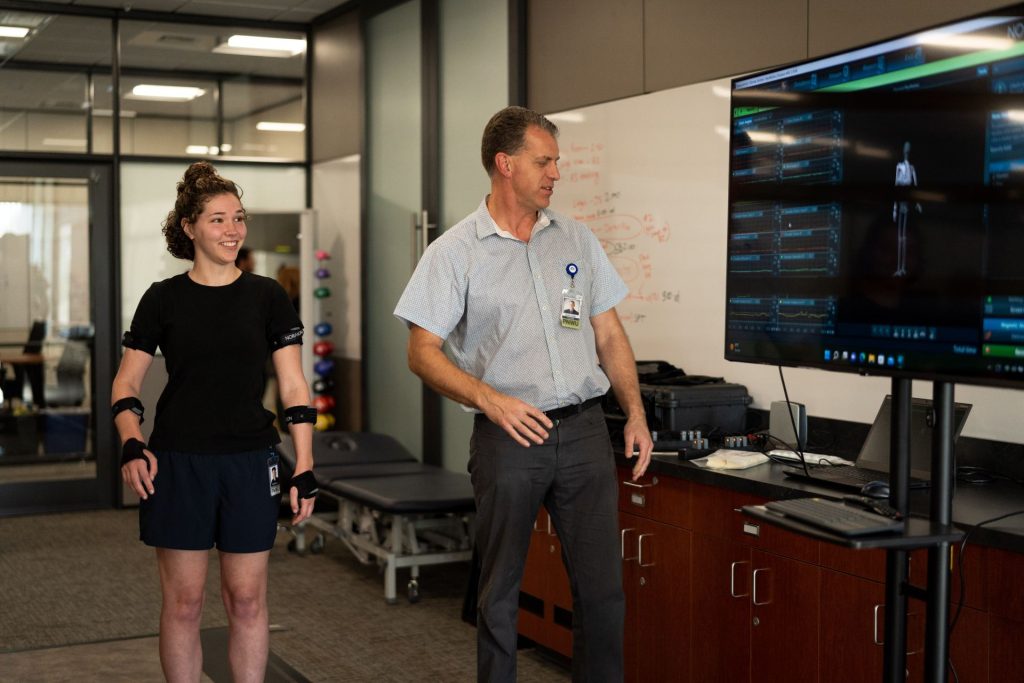Why Pacific Northwest University?
Pacific Northwest University of Health Sciences has built a recruit, educate, and return model to address a significant shortage of health care professionals in the Northwest (Alaska, Idaho, Montana, Oregon, and Washington). PNWU emphasizes recruitment of students from rural or medically underserved locations and educates students in such areas with intended outcome of graduates returning to practice in those or similar communities.
The DPT program’s curriculum emphasizes a rural-focused curriculum consisting of didactics, labs, simulated experiential learning, full-time clinical experiences, community-based service-learning projects, and a culminating capstone project. Students have an opportunity to learn and participate in community-based research with faculty in the Center for Applied Movement Sciences (CAMS) laboratory located on-campus.
Students will complete coursework in movement and behavioral sciences, professional and interprofessional practice, evidence-informed practice, clinical reasoning, and patient management, including for special populations. They will also develop a strong moral foundation and soft skills necessary for PT practice including social and emotional intelligence, cultural competencies, and understanding social determinants of health. Evidence-informed principles and clinical decision-making skills will be applied in professional practice courses and integrated clinical experiences at various health settings.
PNWU’s DPT program will partner with numerous hospitals, clinics, and health agencies in the five-state Northwest region to provide students with clinical experiences, as well as regional graduate health science programs to provide a cross-discipline interprofessional learning environment. Partners include Heritage University (Nursing), Whatcom Community College (Physical Therapy Assistants), and Washington State University (Nursing and Pharmacy), working with medical students from the College of Osteopathic Medicine at PNWU.
School of Physical Therapy Information Sessions

Core Values
PNWU’s 112 credit-hour physical therapy curriculum is organized around five transcurricular threads based upon the American Physical Therapy Association’s Vision Statement, Core Values, and Code of Ethics documents:
- Rural and Medically Underserved: Students will provide a continuum of care for rural and underserved communities that is safe, effective and efficient in all aspects of patient management, interpersonal relations, and professional conduct, while demonstrating responsiveness to the individualized needs and well-being of clients/patients “regardless of age, gender, race, nationality, religion, ethnicity, social or economic status, sexual orientation, health condition, or disability”.
- Movement Experts: The student will articulate the importance of movement systems across the lifespan through the application of course content to the practice of physical therapy, research, and education to meet the vision of the profession to “transform society by optimizing movement to improve the human experience.”
- Interprofessional Practice: Students will develop the core competencies needed for effective collaborative practice. The interprofessional Education Collaborative (IPEC) defines these competencies as: (1) mutual respect and shared values with other members of the healthcare team; (2) an appreciation for the skills and resources provided by other professionals that complement the physical therapist’s expertise; (3) responsive communications that are clear, timely, and respectful; and (4) team development through relationship building, shared problem-solving and accountability use, of evidence,m and effective leadership.
- Evidence-Informed Practice: The student recognizes and demonstrates the ability to critique assigned readings and other published literature taking “personal responsibility for their professional development based upon critical self-assessment and reflection” within the context of the advancement and innovation of physical therapy practice. Demonstrating an understanding that the use of evidence-informed practice is central to providing high-quality care. Further, as a researcher and scholar “shall abide by accepted standards governing the protection of research participants”.
- Social Justice: The student will demonstrate “respect, the inherent dignity and rights of all individuals” in all aspects of their role as a healthcare provider assuring recognition of their personal biases to prevent discrimination against others while demonstrating independent and objective professional judgment in the patient/client’s best interest within the physical therapists’ scope of practice. Students will provide care that is respectful of, does not vary in quality, and is responsive to individual preferences, needs, and values when making clinical decisions with their patients, as well as applying course content to the entire classroom community including, but not limited to: instructors, peers, patients, clients, families, caregivers, other practitioners, and community partners.

State-of-the art facilities
In 2019, Watson Hall, a 28,000-square-foot building was built to accommodate the addition of new health sciences programs, including physical therapy. The School of Physical Therapy occupies the first floor which includes faculty offices, conference rooms, classrooms, clinical and research laboratories, and student study space with enterprise-grade televisions with AirMedia capability and whiteboards throughout.
The School of Physical Therapy also shares space with the College of Osteopathic Medicine in Butler Haney Hall that has additional classroom and lab space, as well as a state-of-the-art cadaver laboratory and clinical simulation center, that incorporates standardized patient activities and high-fidelity patient simulation.
Collaborative research
As a PNWU DPT student, you’ll complete a faculty-supervised scholarly project, working in small groups of two or three students. Formal dissemination of these projects occurs in the fall semester of your third year, just before you complete your final full-time clinical experience.
Your future as a physical therapist
Whether you have been drawn to physical therapy from personal experience, a calling to work closely with those in rural and medically underserved communities, or a desire for more career flexibility, at PNWU, you’ll be prepared for a rapidly expanding field that is nationally recognized for job satisfaction and earning potential. Nationwide, the average salary for a physical therapist is $91,680 per year, while the average starting salary for a new physical therapy graduate in Washington is $75,000.
You must complete a Doctor of Physical Therapy degree at a CAPTE-accredited program before you can sit for the national physical therapy exam. Licensure is administered by the state(s) in which you’ll practice.
Doctor of Physical Therapy Program
Mission and Vision
Accreditation
Curriculum Plan
Clinical Education Experiences
Admissions Requirement
Cost of Attendance
Academic Calendar
Information Sessions
Faculty and Staff
Know the PT Field
Student Financial Facts
SOPT Newsletter
Contact Information
Peggy R. Trueblood, PT, PhD
School of Physical Therapy
Professor and Dean
509.249.7709
ptrueblood@pnwu.edu

For general questions about the DPT program, please email dpt@pnwu.edu or call 509.249.7725.